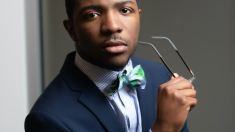A few months ago, I was at work and received a call from my son’s school. Most moms will tell you they dread seeing the number of their child’s school pop on the caller ID because there’s a split second where you’re panicked and thinking your baby is hurt. That panic is usually relieved by a teacher or administrator on the other end of the line telling you that your child disobeyed some rule or forget his lunch. This time, the call was for the former. The Dean of Students at my baby’s school was calling to inform me that my son, a 7-year-old in second grade, was refusing to take off his gloves in the classroom and had to be removed.
Generally, I try to maintain a certain level of professionalism and decorum when dealing with school staff. However unfair, I know their impressions of me factor into how they interact with my child. That day, though, was the culmination of my intensifying annoyance with the staff’s inability to weigh the importance of enforcing rules against the good of my child. I asked the Dean why she, a woman at least four times my child’s age, believed it was productive to remove my child from the learning environment because he wanted to keep on his gloves. “Well, we have rules,” she replied smugly. The exchange that followed was a textbook Black mama read.
Despite their stellar curriculum, I’ve since removed my son from that school. It’s not that I believe my baby shouldn’t have to follow rules–it’s a given that structure requires some boundaries. But far too often the U.S. educational system prioritizes following rules over the well-being and productivity of students, particularly Black students like my son. It’s as if the primary function of schools has become to teach, enforce and reinforce the concept of absolute obedience to authority, drastically punishing the smallest infraction or challenge to the rules to prepare these children for a world where they are to do as they are told, and only as they are told.
When Black children test boundaries at school, it is not treated as a normal part of the growing process, but rather as a direct threat to administration. Our children are being placed in the proverbial town square, and made examples of for any student who dares challenge unfair regulations and their biased application, or attempt to express their individuality. It seems to be a way to ensure we ultimately raise Black children who do not challenge the complex system of structures and norms that oppress us, thus maintaining the status quo of Black second-class citizenship.
Three recent incidents in which Black graduating seniors were denied participation in commencement activities highlight this phenomenon. These kids had the most important moments of their high school careers outright denied to them, or at least sullied, by administrators determined to rule with iron fists. And though all three had exemplary academic performances, their admirable attempts to stand up for what they believed in were met with an all too familiar fascism that has become synonymous with the education system.
Louisiana teen Andrew Jones, the valedictorian of his high school class with a perfect 4.0 GPA, was denied the right to participate in the culmination ceremony because he refused to shave his beard, despite the fact that Jones had sported a beard throughout his entire four years of high school in violation of the never-enforced, “no beards” policy of the school. California teen Nyree Holmes, a National Merit Scholar, was removed from his graduation ceremony by three Sacramento County Sheriffs because he refused to remove a kente cloth scarf he wore to his cultural pride. Illinois teen Taiylar Ball, a member of the National Honor Society, was denied the right to attend her prom, and at first told she couldn’t participate in the graduation (after media attention and public outcry, Ball was allowed to participate in the festivities) because she recited a piece containing the n-word. This graduation season sent a loud and clear message that even when our children do the very things we tell them to do to avoid becoming a statistic or stereotype – study hard, stay out of trouble, make the best grades — they’re still at the mercy of a system that will never treat them fairly.
Undoubtedly these scholars were required to take a course or two in U.S. civics/government, and were taught about the democratic process. They were fed the propaganda of how America’s Constitutional guarantees freedom of speech and expression, and taught it’s exactly what makes the country great. Textbooks attempted to indoctrinate them to believe that their voices counted and, if nothing else, this country and all its entities were built to ensure fairness and equality.
And then, they were shown that those guarantees don’t apply to them. They were shown that embracing their roots and culture is a punishable offense. They were shown that the powers that be will expect them to choose between academic excellence and loving their Blackness. They were reminded that their autonomy will always be questioned. They were treated to the universal Black experience of disillusionment.
There seems to be a deliberate effort to shrink these young adults, to bring them to heel and accustom them to yielding unquestionably to those in power. These young people are the kind of articulate, educated, and confident Black people once publicly–and now privately–referred to as “uppity.” To some, their conviction, coupled with their achievement, is intimidating, and so it must be controlled. Though it’s frustrating to watch, I find some comfort in the idea that our society is so intent on quelling the fight and fire in our best and brightest because they recognize how powerful they are. And I take solace in our kids’ power–and willingness to fight back.
La Sha is a writer and blogger who is passionate about Black people. Find her on Twitter @knflkkollective.com.













